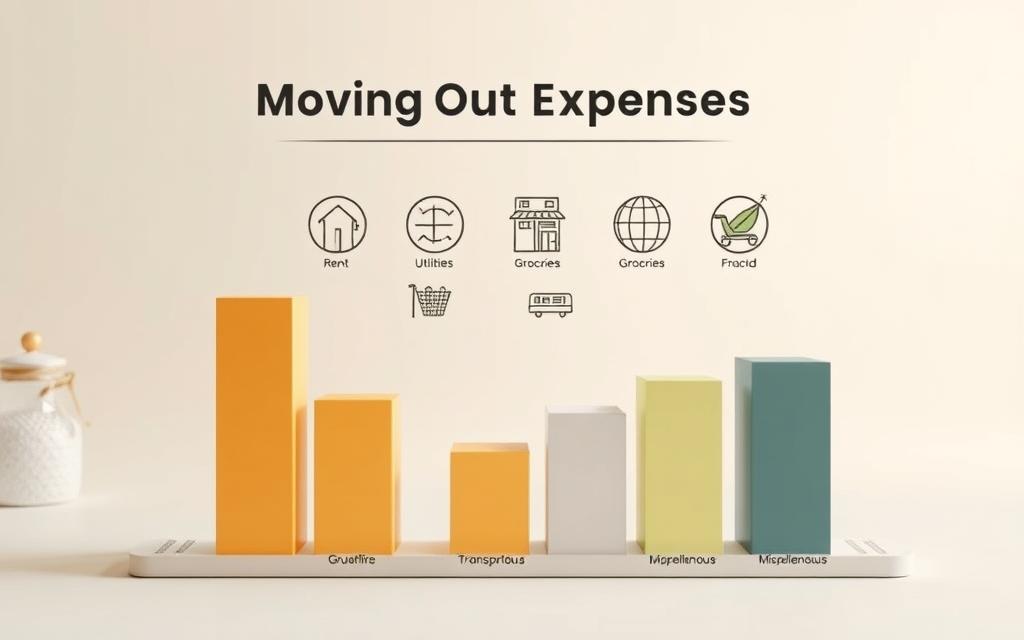adversiment
A whopping 72% of young Aussies aged 18-34 still live with their parents. Moving out is a big financial step. It needs careful planning and money smarts.
Leaving home isn’t just about freedom. It’s a tricky money journey that needs thought. This guide will help you prep your finances for your new pad.
Living on your own can be scary money-wise. Young Aussies need a solid plan to make it work. From rent to bills, there’s lots to think about.
Our checklist breaks down the money side of moving out. We’ll help you turn this big life change into something you can handle. You’ll learn about budgets, costs, and how to manage your cash.
Getting ready is crucial. With the right know-how and planning, you’ll set yourself up for success. You’ll grow both financially and personally.
Understanding the Costs of Moving Out
Moving out is a big financial step. It needs careful planning and understanding of expenses. Young Aussies must manage their money well for independent living.
A good strategy covers all aspects of living alone. Breaking down costs helps create a realistic budget. This approach prevents unexpected financial stress.

Initial Expenses to Consider
Moving out comes with upfront costs. Budget carefully for these expenses:
- Rental bond (typically 4-6 weeks’ rent)
- First month’s rent in advance
- End of lease cleaning services
- Moving equipment and transportation
- Furniture and household essentials
Ongoing Living Costs
Monthly expenses need consistent money management. Here’s a breakdown of recurring payments:
| Expense Category | Estimated Monthly Cost |
|---|---|
| Rent | $1,500 – $2,500 |
| Utilities | $200 – $400 |
| Groceries | $300 – $500 |
| Transportation | $100 – $250 |
Emergency Funds and Savings
Create an emergency fund for unexpected situations. Save at least 3-6 months of living expenses. This covers job loss or medical emergencies.
Plan your bond return carefully. Meet all end of lease cleaning requirements. This increases your chances of getting the full deposit back.
“Financial planning isn’t about being perfect. It’s about being prepared.” – Unknown
Plan strategically and understand these costs. You’ll set yourself up for successful independent living.
Budgeting for Your Move
Moving can be costly, but smart planning helps manage expenses. A comprehensive budget is key for a smooth transition to your new home. Careful preparation can reduce stress and prevent financial strain.
Start by getting accurate removalist quotes. Implement strategic packing tips to save money. Knowing where your money goes helps you stay on track financially.
Creating a Moving Budget
A good moving budget covers various expenses. Consider these key components:
- Removalist quotes and transportation costs
- Packing supplies and materials
- Potential storage fees
- Travel expenses
- Utility connection charges
Tracking Your Expenses
Keep a close eye on your spending during the move. Use digital tools to track expenses accurately:
- Download budgeting apps like Mint or YNAB
- Create a spreadsheet with detailed expense categories
- Save all receipts related to moving
- Review expenses weekly
Allocating Funds for Unexpected Costs
Set aside money for surprise expenses. Experts suggest keeping 10-15% of your total moving budget for unexpected costs.
Pro tip: When getting removalist quotes, ask about potential hidden fees to avoid financial surprises.
| Expense Category | Estimated Cost Range |
|---|---|
| Removalist Services | $500 – $2,500 |
| Packing Supplies | $100 – $500 |
| Utility Connection | $50 – $300 |
| Emergency Fund | 10-15% of total budget |
Use these packing tips to save money on your move. Stay disciplined with your budget for a financially manageable relocation.
Calculating Rent and Utilities
Moving out involves complex rental and utility expenses. Understanding these costs helps you plan your budget effectively. This knowledge prevents unexpected financial surprises during your move to independent living.
Renters face several financial considerations when disconnecting and connecting utilities. This process involves multiple steps and potential costs. These expenses can significantly impact your overall moving budget.
Average Rent in Major Australian Cities
Rental prices vary across Australian cities. Here’s a snapshot of typical monthly rental ranges:
- Sydney: $450 – $700 per week
- Melbourne: $400 – $650 per week
- Brisbane: $350 – $550 per week
- Perth: $350 – $500 per week
- Adelaide: $300 – $450 per week
Utility Costs: What to Expect
Utility disconnection and reconnection can involve several fees. Typical monthly utility expenses might include:
- Electricity: $100 – $200
- Gas: $50 – $100
- Water: $40 – $80
- Internet: $60 – $100
Deposits and Connection Fees
Be prepared for potential connection fees when managing utility disconnection. Providers often charge:
- Connection fees: $10 – $50 per service
- Disconnection fees: $20 – $80
- Bond or security deposits: Varies by provider
Pro tip: Compare utility providers to minimise utility disconnection and connection costs.
Plan ahead and budget for these expenses. This approach ensures a smooth transition to your new home.
Insurance Needs for Moving Out
Moving out is exciting, but it comes with financial responsibilities. Insurance protects your belongings and manages risks during rental inspections.
Understanding insurance options is crucial when renting your first home.
Critical Insurance Types for Young Renters
When setting up your new home, consider these insurance categories:
- Contents Insurance
- Personal Liability Coverage
- Renters Insurance
- Emergency Replacement Insurance
Contents Insurance vs. Landlord Insurance
Contents insurance protects your personal items. Landlord insurance covers property owned by the rental owner.
Knowing these differences can prevent financial gaps during inspections.
| Insurance Type | Coverage Details | Typical Cost Range |
|---|---|---|
| Contents Insurance | Personal items, electronics, furniture | $180-$350 annually |
| Landlord Insurance | Building structure, fixtures | $500-$1200 annually |
Finding the Right Insurance Provider
Consider these steps when choosing an insurance provider:
- Compare multiple insurance quotes
- Check customer reviews
- Understand policy exclusions
- Verify coverage during rental property inspections
Pro tip: Many Australian insurers offer bundled packages that can reduce overall insurance costs for young renters.
Setting Up Payments and Banking
Moving out involves complex financial changes. A solid banking foundation is vital for young adults starting independent living. Careful planning is key to managing finances effectively.
Notify banks of your new address when moving. This ensures smooth communication with your financial institutions.
Opening a New Bank Account
Choose the right bank account to simplify money management. Look for these features:
- Low or no monthly account fees
- Online and mobile banking capabilities
- Convenient ATM network
- Competitive interest rates
Setting Up Direct Debits and Payments
Automate bill payments to avoid missing deadlines. Try this approach for recurring expenses:
- List all monthly bills
- Set up direct debits for rent and utilities
- Schedule automatic transfers to savings
- Monitor transactions regularly
Managing Your Finances Remotely
Digital banking tools make money management easier. Use mobile apps to track spending and set budgets. Get real-time notifications about your account activities.
Keep an eye on your new address details across all platforms.
Pro tip: Always maintain a buffer in your account to cover unexpected expenses and protect your credit rating.
Saving for Moving Day Expenses
Moving can be financially challenging, especially for first-timers. Understanding the costs helps you budget effectively and avoid surprises. Careful planning and smart money management are key to a smooth move.
Gathering removalist quotes is crucial when preparing to move. Compare multiple quotes to find the best value. Try these strategies to minimize expenses during your transition.
Packing Supplies and Equipment
Save money with these effective packing tips:
- Collect free cardboard boxes from local stores
- Use existing luggage and containers for packing
- Purchase packing materials in bulk
- Rent reusable moving boxes instead of buying
Hiring Professional Movers vs. DIY
Your budget and move complexity determine whether to hire pros or DIY. Professional removalist quotes typically range from $300 to $1,500. This depends on distance and item volume.
Additional Costs to Consider
Budget for these potential extra costs:
- Vehicle hire
- Temporary storage fees
- Cleaning supplies
- Insurance protection
Pro tip: Always set aside an extra 10-15% of your moving budget for unexpected expenses.
Understanding Your Lease Agreement
Rental contracts can be tricky for new tenants. They outline expectations between you and your landlord. Knowing the details can prevent money troubles and ensure a good tenancy.
Key Terms to Look For
Check these important parts of your lease agreement:
- Rental period duration
- Monthly rent amount
- Bond return conditions
- Maintenance responsibilities
- Rental property inspection schedules
Responsibilities as a Tenant
Your lease sets out your duties. These often include:
- Paying rent on time
- Maintaining the property in good condition
- Allowing scheduled rental property inspections
- Reporting maintenance issues promptly
- Respecting noise and occupancy limits
Breaking a Lease: Financial Implications
Ending a lease early can be expensive. Know the possible money penalties for responsible planning.
| Lease Breaking Scenario | Potential Costs |
|---|---|
| Early termination within first 6 months | Forfeit full bond + 1-2 months’ rent |
| Breaking lease with notice | Advertising costs + remaining rent until re-let |
| No-fault lease termination | Minimal or no financial penalty |
Read your lease’s terms on bond return and inspections. This can help reduce possible money risks.
Managing Utilities and Services Transfers
Moving homes requires careful management of utility disconnections and address changes. This step ensures a smooth transition between residences. It prevents service interruptions and billing issues.
Utility transfers need strategic planning and good communication with service providers. Your aim is to move essential services without unexpected disruptions.
Transferring Existing Utilities
Create a checklist for utility disconnection before moving. Contact current providers at least two weeks before your move date. Schedule service termination with them.
- Electricity providers
- Gas companies
- Internet and telecommunications services
- Water utilities
Setting Up New Services
Start setting up new utility connections right after confirming your moving date. Proactive preparation prevents potential service gaps.
“Preparation is key when transferring utilities. Always plan ahead and communicate clearly with service providers.” – Australian Moving Experts
Comparing Service Providers
Different regions in Australia offer varied utility service options. Research to find cost-effective and reliable providers for your new location.
Use online comparison tools to evaluate:
- Connection fees
- Monthly rates
- Contract flexibility
- Customer support quality
Update your address with each utility provider. This ensures smooth billing and communication during your move.
Adjusting to Living Independently
Moving out of home marks an exciting milestone. This shift to independent living demands careful financial planning. It also requires practical skills beyond just managing money.
Living on your own means taking charge of your finances. Your success hinges on effective budgeting and smart expense management.
Budgeting for Food and Essentials
Creating a smart food budget is vital for young Australians living solo. Here are some practical strategies to consider:
- Plan meals in advance to reduce impulse spending
- Buy groceries in bulk to save money
- Use loyalty programs and discount apps
- Cook meals at home instead of eating out
“Smart budgeting isn’t about restricting yourself, it’s about making informed financial choices” – Financial Planning Australia
Managing Household Expenses
Use budgeting apps or spreadsheets to track your spending. Set up automatic bill payments to avoid late fees. Create a savings account for unexpected costs.
Importance of Money Management Skills
Strong financial literacy is key to thriving on your own. Learn to distinguish between wants and needs, set realistic financial goals, and always maintain an emergency fund.
- Attend financial workshops
- Read personal finance books
- Use online budgeting tools
- Seek advice from financial professionals
Preparing for Your New Life
Moving out of home is a big step in your money journey. It’s more than just packing and finding a new place. You need to plan your finances and set long-term goals.
Start by building an emergency fund. Aim for three months of living expenses. Set up automatic transfers to a savings account. This helps your fund grow steadily.
Learn to manage your money wisely. Track your spending and develop good habits. Your new freedom requires careful budgeting.
Create a system for updating your details. Use Australia Post’s mail redirection service. Update your address with banks, Medicare, and your job.
Settling in is about more than money. Join local groups and explore your new area. Establish routines for stability. Remember, building strong finances takes time and effort.
Your moving out checklist should cover both practical and financial aspects. Plan for your immediate needs and future growth.



